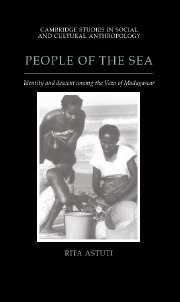22 results
1 - Death, Ancestors, and the Living Dead: Learning without Teaching in Madagascar
-
-
- Book:
- Children's Understanding of Death
- Published online:
- 03 May 2011
- Print publication:
- 25 April 2011, pp 1-18
-
- Chapter
- Export citation
Why a theory of human nature cannot be based on the distinction between universality and variability: Lessons from anthropology
-
- Journal:
- Behavioral and Brain Sciences / Volume 33 / Issue 2-3 / June 2010
- Published online by Cambridge University Press:
- 15 June 2010, pp. 83-84
-
- Article
- Export citation
Learning that there is life after death
-
- Journal:
- Behavioral and Brain Sciences / Volume 29 / Issue 5 / October 2006
- Published online by Cambridge University Press:
- 08 December 2006, pp. 475-476
-
- Article
- Export citation
2 - “It's a boy,” “it's a girl!” Reflections on sex and gender in Madagascar and beyond
-
-
- Book:
- Bodies and Persons
- Published online:
- 05 June 2012
- Print publication:
- 28 March 1998, pp 29-52
-
- Chapter
- Export citation
8 - Working for the dead
-
- Book:
- People of the Sea
- Published online:
- 30 October 2009
- Print publication:
- 23 March 1995, pp 123-152
-
- Chapter
- Export citation
1 - Introduction
-
- Book:
- People of the Sea
- Published online:
- 30 October 2009
- Print publication:
- 23 March 1995, pp 1-13
-
- Chapter
- Export citation

People of the Sea
- Identity and Descent among the Vezo of Madagascar
-
- Published online:
- 30 October 2009
- Print publication:
- 23 March 1995
Contents
-
- Book:
- People of the Sea
- Published online:
- 30 October 2009
- Print publication:
- 23 March 1995, pp vii-vii
-
- Chapter
- Export citation
4 - Avoiding ties and bonds
-
- Book:
- People of the Sea
- Published online:
- 30 October 2009
- Print publication:
- 23 March 1995, pp 61-77
-
- Chapter
- Export citation
7 - Separating life from death
-
- Book:
- People of the Sea
- Published online:
- 30 October 2009
- Print publication:
- 23 March 1995, pp 106-122
-
- Chapter
- Export citation
2 - Acting Vezo in the present
-
- Book:
- People of the Sea
- Published online:
- 30 October 2009
- Print publication:
- 23 March 1995, pp 14-43
-
- Chapter
- Export citation
9 - Conclusion
-
- Book:
- People of the Sea
- Published online:
- 30 October 2009
- Print publication:
- 23 March 1995, pp 153-158
-
- Chapter
- Export citation
5 - Intermezzo
-
- Book:
- People of the Sea
- Published online:
- 30 October 2009
- Print publication:
- 23 March 1995, pp 78-79
-
- Chapter
- Export citation
List of illustrations
-
- Book:
- People of the Sea
- Published online:
- 30 October 2009
- Print publication:
- 23 March 1995, pp viii-viii
-
- Chapter
- Export citation
Cambridge Studies in Social and Cultural Anthropology
-
- Book:
- People of the Sea
- Published online:
- 30 October 2009
- Print publication:
- 23 March 1995, pp 189-192
-
- Chapter
- Export citation
List of references
-
- Book:
- People of the Sea
- Published online:
- 30 October 2009
- Print publication:
- 23 March 1995, pp 179-184
-
- Chapter
- Export citation
6 - Kinship in the present and in the future
-
- Book:
- People of the Sea
- Published online:
- 30 October 2009
- Print publication:
- 23 March 1995, pp 80-105
-
- Chapter
- Export citation
Frontmatter
-
- Book:
- People of the Sea
- Published online:
- 30 October 2009
- Print publication:
- 23 March 1995, pp i-vi
-
- Chapter
- Export citation
Index
-
- Book:
- People of the Sea
- Published online:
- 30 October 2009
- Print publication:
- 23 March 1995, pp 185-188
-
- Chapter
- Export citation
Notes
-
- Book:
- People of the Sea
- Published online:
- 30 October 2009
- Print publication:
- 23 March 1995, pp 159-178
-
- Chapter
- Export citation



